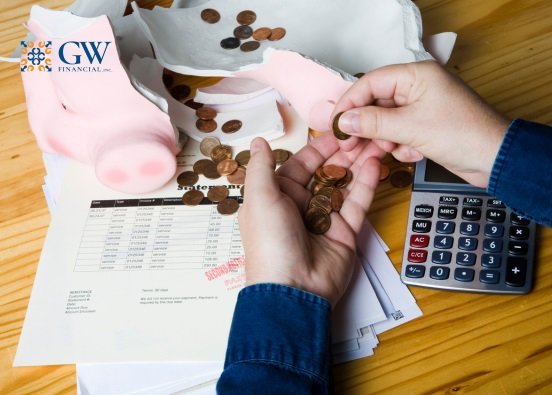Cash-Out Refinancing
Did you know, that refinancing your mortgage can offer more benefits than lowering your interest rate? Another powerful way to utilize cash-out refinancing is to borrow enough to repay any high-interest debt that is consuming a large chunk of your income.
For example, if you are paying the minimum payment on a credit card with 24.99% APR, you are mostly paying the interest and hardly touching the balance of the credit card. Over time, this can add up to large amounts of money being used to pay off interest instead of being invested towards a financial goal. Using the cash from refinancing to pay off credit cards could be an effective strategy for tackling high-interest debt. A cash-out refinance will come at a significantly lower interest rate, and in most scenarios, cash-out refinancing does not significantly change your mortgage payment amount. You can choose to refinance to a shorter term, like 15 years instead of 30 years, or you can restart the same 30-year mortgage term. Any way you choose to use your cash-out refinance, consult a financial advisor to make sure it is the right strategy for you and your situation.
Example:
Chuck and Lisa were approved for a cash-out refinance after interest rates dropped and home market values soared. They had credit card debt but have always wanted to own rental incomes. Chuck’s father always said rental properties were a great way to earn a secondary income. The couple got $30,000 in cash from their refinance and immediately contacted a realtor to look for an investment property. They were able to find a small home they could buy and rent. Their offer was accepted, and they were the proud new owners of an investment property within a few months.
Now came time to find a renter. At first, they decided to manage this process themselves but found it difficult to keep up with the influx of inquiries as both worked full time. They decided to hire a property management company that would cost them 10% of the monthly rent. In order to use the property management company, the house had to meet certain standards. During the inspection, they found the water heater needed to be replaced and the home needed to be repainted. The home insurance company also did an inspection which required the roof to be repaired and the porch railing fixed.
These repair costs took Chuck and Lisa by surprise. They thought they would be able to list the property relatively quickly to start generating income, but instead, they were now saddled with high-cost repairs and updates. During this process, the home was unoccupied for 6 months, which put great financial strain on the couple. Because they used the cash from refinancing to purchase a rental property, they did not pay off their high-interest credit card debt. In fact, they had to put some of the home repairs on another credit card. Now, they live paycheck to paycheck and don’t have a cash reserve for emergencies like a car repair, an unexpected hospital visit, or another home repair. Once occupied, the rent generated was barely enough to cover the mortgage, insurance, and property management costs. As it was fair for the market, they couldn’t raise the rent until the lease renewed the following year.
In the long run, they will likely see a return on their investment as the housing market increases. Eventually, it should generate enough income to begin repaying their high interest credit cards. Creating the right strategy for their situation from the beginning would have prepared this couple for the hurdles they were to face. If Chuck and Lisa had contacted a financial advisor, they could have reviewed the costs and potential return of investment properties versus the benefit of paying off debt and saving up to purchase a rental property when they’re ready. This would have saved the couple a lot of marital stress and money spent on high-interest debt.
GW Financial, Inc. is a fee-only firm and offers a complimentary Getting Acquainted Call to help set you on the right path. Click HERE to schedule a 30-min personal check-in.
The content is developed from sources believed to be providing accurate information. The information in this material is not intended as tax or legal advice. It may not be used for the purpose of avoiding any federal tax penalties. Please consult legal or tax professionals for specific information regarding your individual situation. This material was developed and produced by GW Financial, Inc. to provide information on a topic that may be of interest. The opinions expressed and material provided are for general information, and should not be considered a solicitation for the purchase or sale of any security. Copyright 2023 GW Financial, Inc.

